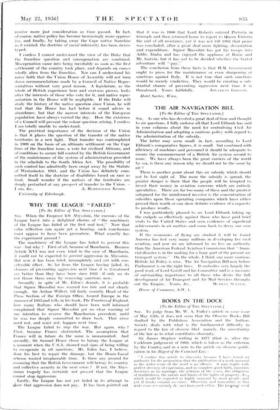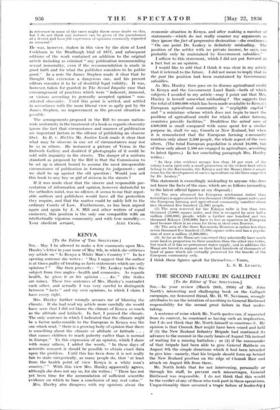Sin, To judge from Mr. W. A. Fuller's article in
your issue of May 15th, it does not scene that the Obscene Hooks Hill drafted by the Publishers Association and the Authors
Society deals with what is the fundamental difficulty in regard to the law of obscene libel namely. the uncertainty of the law as to what constitutes obscenity.
Sir James Stephen writing in 1877 (that is, after the Cockburn judgement of 18(38, which is taken as the criterion by the Courts) said in a note to the article on obscene publi-
cation in his Digest of the Criminal Law : "I confine this article to obscenity because I have found no authority for the proposition that the publieation of a work immoral in the wider snise of the word is an offenee. A Mall might with perfect decency of expression, and in complete good faith, maintain doctrines as to marriage, the relation of the sexes, the obligation of truthfulness, the nature and limits of the rights of property, Arc., which would be regarded as highly immoral by most people, and yet (I think) commit no crime. Obscenity and irn rrrrr rality in this
wide sense toe entirely di.: from each other. The language used
in reference to some of the cases might throw some doubt on this, but I do not think any instance can be given of the punishment of a decent and bona fide expression of opinions commonly regarded as immoral."
He was, however, shaken in this view by the dicta of Lord Cockburn in the Bradlaugh trial of 1877, and subsequent editions of the work contained an addition to the original article including as criminal " any publication recommending
sexual immorality, even if the recommendation is made in good faith and for what the publisher considers to be public good." In a note Sir James Stephen made it clear that he thought this extension a dangerous one, and his present
editors consider it to be of doubtful legal validity. It was, however, taken for granted in The Sexual impulse case that
encouragement of practices which were " indecent, immoral, or vicious according to generally accepted opinion " con- stituted obscenity. Until this point is settled, and settled in accordance with the more liberal view so aptly put by Sir James Stephen, no improvement in the present situation is possible.
The arrangements proposed in the Bill to ensure nation- wide uniformity in the treatment of a book as regards obscenity ignore the fact that circumstance and manner of publication arc important factors in the offence of publishing an obscene
libel. In B. v. Ilicklin Mr. Justice Lush made it clear that
what may be obscene in one set of circumstances may not be so in others. He instanced a picture of Venus in the Dulwich Gallery and doubted if photographs of it could be sold with impunity in the streets. The danger of a uniform standard as proposed by the Bill is that the Commission to be set up is almost bound to assume the most irresponsible circumstance of publication in forming its judgement ; and we shall be up against the old question : Would you sell this book to any boy or girl of sixteen in the streets ?
If it was made clear that the sincere and responsible pre- sentation of information and opinion, however distasteful to the orthodox mind, was no offence, it seems to me that reput- able authors and publishers would have all the protection they require, and that the matter could be safely left to the ordinary Courts of Law. Furthermore, as has been argued again and again by J. S. Mill and other writers of equal
eminence, this position is the only one compatible with an intellectually vigorous community and with true morality.—



















































 Previous page
Previous page